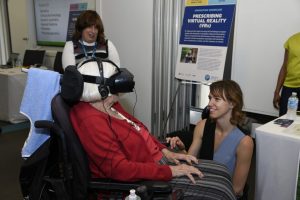In honour of Alzheimer’s Awareness Month, CABHI is featuring a new piece of content each week over the month of January. Every week corresponds to one of CABHI’s five core Innovation Themes. This week’s blog focuses on caregiver support.
Family caregivers of people living with dementia face unique challenges. Though caregiving can be a rewarding experience, it can also place a lot of strain on time, finances, and emotions, leaving many caregivers feeling overwhelmed, particularly when balancing caregiving duties with other responsibilities like work and childcare.
Supporting caregivers is more important today than ever before. The pressures of the COVID-19 pandemic on our healthcare system have made it even more challenging for family members to access the support services that they need for themselves and their loved ones.
That’s why the Centre for Aging + Brain Health Innovation (CABHI) invited frontline care workers, clinical managers, and clinical researchers to submit an innovative idea aimed at improving the lives of older adults, persons with dementia, and their care partners to the Spark-ON program. Spark-ON is a subsidiary of CABHI’s Spark Program, which supports the development of grassroot solutions by frontline healthcare workers and researchers that solve real-world critical care challenges.
Many of the successful Spark-ON projects are focused on helping family members navigate their caregiver responsibilities, maintain their well-being, or connect with their loved ones in a meaningful way.
Supporting Family Caregivers through Innovation
VRx@Home: Immersive virtual reality therapy for people living with dementia and their caregivers

Lora Appel helps a senior use virtual reality
A University Health Network project team, led by Lora Appel (Assistant Professor at York University) is designing and rigorously evaluating the first Virtual Reality (VR) therapy program for people with Alzheimer’s and related dementias (PwAD) living at home. VR therapy is a drug-free approach to reducing symptoms of Alzheimer’s dementia, such as apathy, feelings of loneliness, sundowning, and the use of harmful sedating medications. VR therapy also has the potential to improve caregiver stress levels, allowing them to continue providing support to PwAD.
Supporting caregivers from ethnocultural communities
The Diverse Caregivers Access Program aims to develop, test, and deliver culturally sensitive and linguistically appropriate resources for caregivers of people living with dementia in various ethnocultural communities. The program, led by Stephanie Conant (Manager, Caregiver Wellness & Social Work at WoodGreen Community Services) will increase access to affordable or free resources that are co-designed with caregiver stakeholders and frontline staff. During the COVID-19 pandemic and beyond, this project aims to improve caregivers’ experience with health and community service navigation and access, improve quality of life, reduce caregiver burden, and provide integrated care for people living with dementia.
iGeriCare: Online dementia training for unregulated care providers
 Based on the award-winning iGeriCare dementia e-learning tool, a project team, led by Dr. Anthony J. Levinson (Director, Division of e-Learning Innovation at McMaster University) has created a series of four e-learning courses about dementia and caregiver well-being for unregulated care providers. The courses cover the foundations of dementia and mild cognitive impairment, responsive behaviours and mental health, home supports and safety, and health promotion and caregiver wellness. A 50 person pilot study, carried out between June 1st and July 8th, 2021 found that participants increased their knowledge about dementia and caregiver well-being by 30 % while using the program.
Based on the award-winning iGeriCare dementia e-learning tool, a project team, led by Dr. Anthony J. Levinson (Director, Division of e-Learning Innovation at McMaster University) has created a series of four e-learning courses about dementia and caregiver well-being for unregulated care providers. The courses cover the foundations of dementia and mild cognitive impairment, responsive behaviours and mental health, home supports and safety, and health promotion and caregiver wellness. A 50 person pilot study, carried out between June 1st and July 8th, 2021 found that participants increased their knowledge about dementia and caregiver well-being by 30 % while using the program.
Virtual music therapy in long-term care during COVID-19 and beyond
Physical distancing and isolation measures implemented during COVID-19 in long-term care (LTC) homes have limited social interaction and recreation opportunities for residents. Increased caregiver distress is of high concern, especially for family members who are sometimes unable to enter the homes and spend time with their loved ones. This research project, led by Dr. Kate Dupuis (Schlegel Innovation Leader at the Centre for Elder Research) is introducing music therapy to virtual family visits to help residents make more meaningful connections with their loved ones, and engage their cognitive, emotional, and social domains of well-being. With funding from CABHI, the findings from this research will be used to create an Implementation Guide that can be shared with other LTC homes and music therapists in Ontario and beyond.
PairingCare: Optimizing dementia homecare
 PairingCare is a novel dementia homecare platform through which persons living with dementia and their caregivers can connect directly with professional homecare providers. The platform, being developed under the leadership of Angie Katherine Puerto Nino (MD, MHSc in Translational Research at the University of Toronto) can be used collaboratively to optimize the dementia journey in various healthcare settings. Puerto Nino and her project team are currently surveying and interviewing people living with dementia, their loved ones, and professional homecare providers to better understand their needs and experiences and refine the PairingCare platform.
PairingCare is a novel dementia homecare platform through which persons living with dementia and their caregivers can connect directly with professional homecare providers. The platform, being developed under the leadership of Angie Katherine Puerto Nino (MD, MHSc in Translational Research at the University of Toronto) can be used collaboratively to optimize the dementia journey in various healthcare settings. Puerto Nino and her project team are currently surveying and interviewing people living with dementia, their loved ones, and professional homecare providers to better understand their needs and experiences and refine the PairingCare platform.


